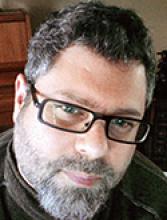As we seek to better understand how we attune ourselves to Divine Spirit, it’s helpful to look at how Jesus’ original disciples attuned themselves to the Holy Spirit. Acts 1 tells us how they prepared for Pentecost and reveals what they were doing that resulted in their Spirit baptism. “These [disciples] all with one mind were continually devoting themselves to prayer.” (Acts 1:14 NASB)
The first key insight here is that they were all with one mind. As I mentioned in my last article, entering a conscious state of “at-one-ment” with the greater whole (with God, one another and creation) is essential to Spirit attunement. (See my last article, May 26, page 15, for more on the subject of “at-one-ment.”)
The second key insight here is that they were constantly devoted to prayer. To understand how the disciples constantly prayed in preparation for the baptism of the Holy Spirit, we have to understand how Jesus taught them to pray.
Jesus is called teacher more than any other name in the Scriptures. He is first and foremost our teacher, training us in a different way of life. The disciples were initially called “people of the way” because they were identified as followers of a new radical way of being. For three years Jesus taught the disciples an alternative way that was on many levels foreign to both the Greco-Roman and Jewish worlds.
The way of Jesus was essentially a path of contemplation and compassion. Take Jesus’ most famous sermon, the Sermon on the Mount. Much of his message is instructing people on how to live a contemplative life.
Here is a summary of Jesus’ teachings in Matthew 6. (Thank you to Fr. Laurence Freeman and Fr. Richard Rohr for helping me see this.)
• Avoid external religion and public piety because it feeds the ego.
• Be wary of praying publically. Invariably the ego gets involved when you’re praying out loud in front of others.
• Instead, when you pray, go into your secret place (your inner room or the mystery place according to some interpretations). Jesus is teaching that prayer is about interiority.
• Don’t use many words when you pray. Jesus is emphasizing silence in prayer.
• God already knows what you need. Prayer isn’t about informing God—it’s about God forming us.
• “Pagans” assume that if they say enough words or the right words in the right order or in the right way they can get God’s attention and move God to do what they ask. This is not how we should pray. Prayer is not about getting God’s attention. Prayer is about us learning to pay attention—to God, to life, to what is.
• Be mindful of what you offer others (judgment or forgiveness) for that is what life will offer you.
• Be mindful of what you value. You worship whatever you value most.
• Your eye—your perspective, the way you see the world, your state of mind—is the lamp of the body. It will determine your experience of reality. If your eye—your worldview or state of consciousness—is healthy, your whole being will be healthy and full of light. If it’s unhealthy, your whole life is unhealthy.
• Don’t be unduly caught up with material things like money, possessions, reputation, etc. Pay attention to ultimate reality. Set your mind on things above—on the things of the Spirit. What you focus on is of utmost importance.
• Be aware of your thoughts, not living on autopilot or jumping from one thought to another.
• Focus on the natural rhythm of the world we live in. Contemplate the beauty.
• Spend time reflecting in nature, on the birds and flowers of the earth. Let them reveal God’s presence and the divine design to you.
• Be in the present moment. Don’t let your mind dwell in the future or the past. Don’t mentally wander to where you should be, could be, would be or were. Focus on the moment you are in—right here, right now. The present moment is the only time and place you can “find” God and experience peace, hope and joy. Now is the only moment Spirit attunement is possible.
I believe Jesus teaches prayer is a way of being. Understanding and putting into practice his teachings on prayer and the contemplative life are essential to attuning ourselves to Divine Spirit.
Troy Watson is pastor of Avon Mennonite Church. (troydw@gmail.com)
--Posted June 18, 2014



Add new comment
Canadian Mennonite invites comments and encourages constructive discussion about our content. Actual full names (first and last) are required. Comments are moderated and may be edited. They will not appear online until approved and will be posted during business hours. Some comments may be reproduced in print.